Published May 19, 2013
EXCLUSIVE INTERVIEW: Dorothy Fontana, Part 2
EXCLUSIVE INTERVIEW: Dorothy Fontana, Part 2
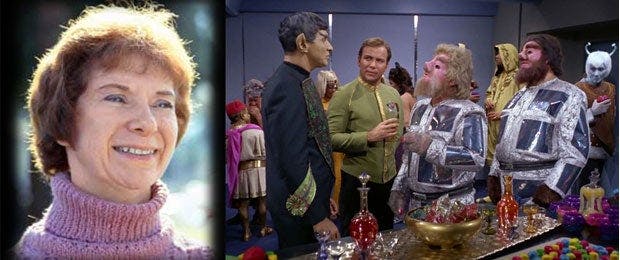
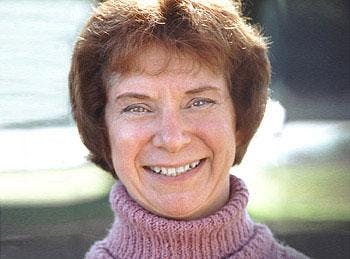
Dorothy Fontana – better known as D.C. Fontana – has led a long and illustrious career in Hollywood as a writer, story editor and producer. Most people, when they hear the name, immediately associate her with Star Trek, and that’s understandable. Fontana was there right at the very beginning of Star Trek: The Original Series. Though she subsequently lent her talents to many other programs, spanning from Bonanza and The Six Million Dollar Man to The Waltons and Babylon 5, Fontana returned to the Trek fold for numerous ensuing ventures, including The Animated Series (serving as story editor and associate producer), The Next Generation (she co-wrote the series’ premiere “Encounter at Farpoint”) andDeep Space Nine (“Dax”). Also on the Trek front, she penned a novel (Vulcan’s Glory), a comic book (Star Trek: Year Four – The Enterprise Experiment), several video games (Bridge Commander, Tactical Assault) and an episode of Star Trek New Voyages: Phase II (“To Serve All My Days”). These days, Fontana remains vitally active as a writer, with several movies, a TV show and an interactive medical education game in varying stages of development. She’s also joined forces with several Trek alumni determined to transform David Gerrold’s The Star Wolf books into a television series. StarTrek.com previously reported on the Kickstarter campaign aimed at funding a Star Wolf pilot – click HERE to read that story and HERE for the Star Wolf Kickstarter page. Today, we conclude our extensive two-part email interview with Fontana, with the conversation centering on her Star Trek output.
What do you remember of working on "Charlie X"?
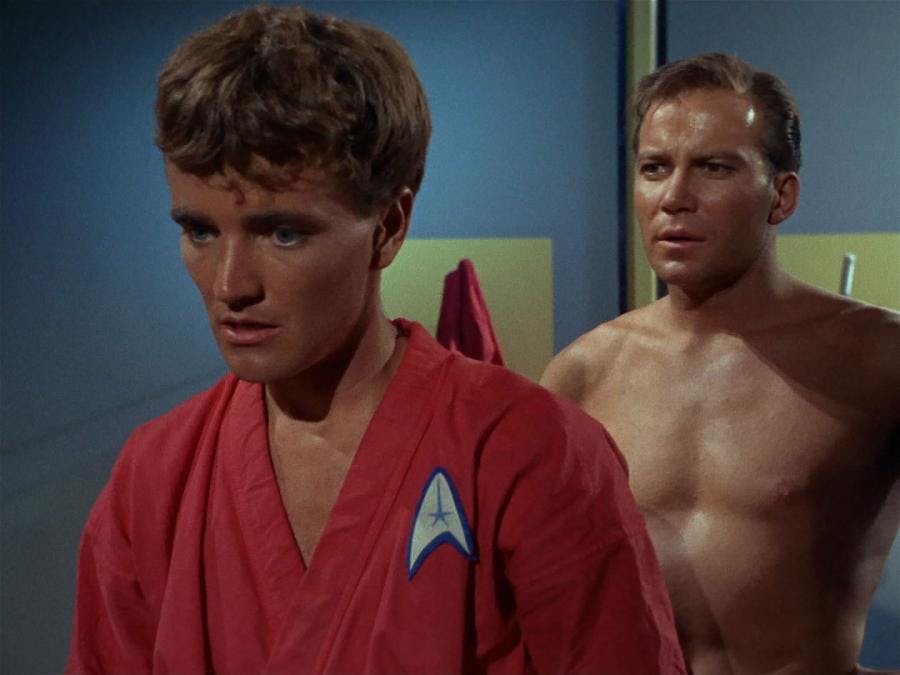
liveringever be with anyone he could ever really touch.In the 1960s, there were very few female writers employed in Hollywood. How seriously did you take that responsibility? How seriously were you taken by Gene and the Trek writing staff?FONTANA: At the time, I wasn't especially aware there were so few female writers doing action adventure scripts. There were plenty doing soaps, comedies, or on variety shows. By choosing to do action adventure, I was in an elite, very talented and very different group of women writers. "How seriously was I taken by Gene and the ST writing staff" is not an applicable question. There was no "writing staff" as there are today. There was Gene Roddenberry and Gene Coon primarily. John D.F. Black and Steve Karabatsos were the two story editors I also worked with (one after the other), but it was primarily me writing and turning in my material to the two Genes and to John or Steve - before I became the story editor. We always worked pretty much one-on-one, and I was given the same consideration as any other writer who came through the door with a good story and delivering a solid script.Which TOS script are yo
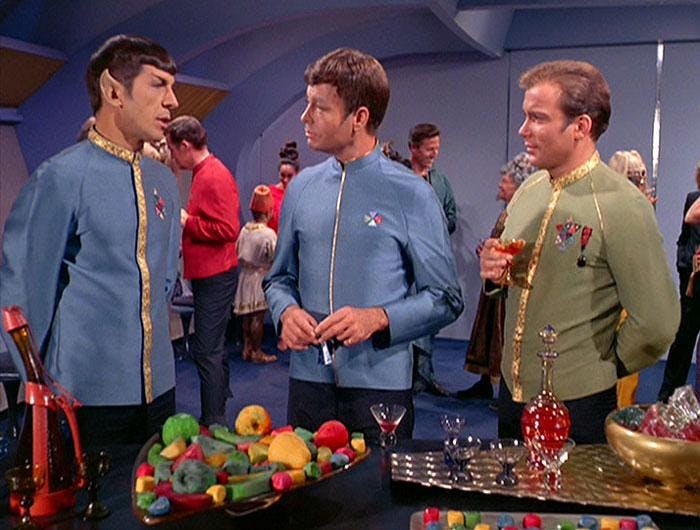
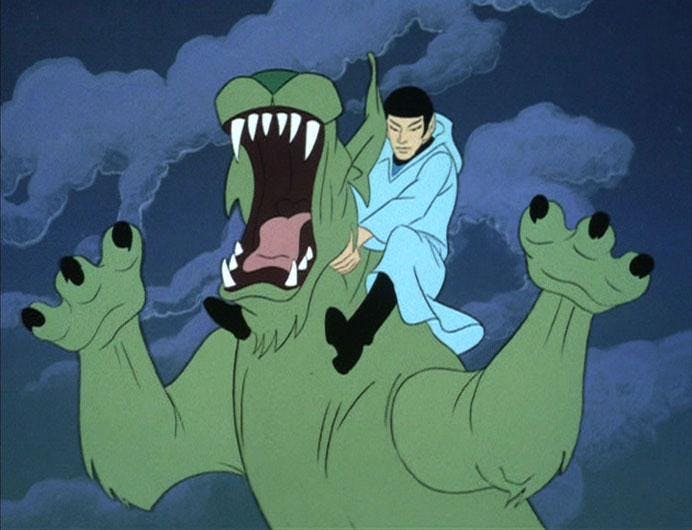
livering a solid script.Which TOS script are you most pleased to have your name on -- and why?FONTANA: I'm especially fond of "Journey to Babel." It opened up the Spock story/background and played on a line in "This Side of Paradise" where Spock refers to his parents. As we entered the second season of STAR TREK, it was clear Spock was an important and popular character, and I wanted to explore who he was as a half-Vulcan half-human and what had made him that way. It has also turned out to be a very popular episode with the fans, for which I am most appreciative.You returned to Trek for The Animated Series. How freeing and/or limiting was writing scripts for an animated series?FONTANA:THE ANIMATED SERIES allowed us to have creatures of all kinds (without worrying about funny costumes, zippers or prosthetic makeup) and also to work in environments of any kind. It was very freeing in that respect. We did STAR TREK stories; we did not do kiddie stories; we did not dumb down our stories. The restraint was the half hour format - and at that time, it was only 23 to 24 minutes of storytelling time - and we were used to 54 minutes of storytelling time in the hour series. We did have to simplify, but I felt we still were doing STAR TREK and being faithful to our audience. Many people (fans) were skeptical about it, but I went to the World Science Fiction Convention in Toronto in September of 1973, with only the animated opening credits to show to an expectant audience. But I have to tell you, when that familiar starship flashed across the screen in the old way, with the music, and with the names of the actors involved - there was a standing ovation. "Yesteryear" is a wonderful episode. Ever wish it were done live-action?FONTANA: Today, "Yesteryear" could be done well, given the state of visual effects of all kinds. And the relationships between Spock, Sarek and Amanda were fleshed out further in relationship to that established in "Journey to Babel." Sure - it would be nice to see it done live action - but there's no one to do it - is there?How surprised were you when TNG came around, and when you were asked to be involved?FONTANA: I was interested when Roddenberry called me to say Paramount was interested in doing a new ST series as an hour show. That was in late 1986. Gene asked me immediately to read all the materials that had been generated on it so far - by David Gerrold, Robert Justman and by him. I was intrigued and drawn into the process by Gene asking me to create a story that would be the pilot for the new series. That bobbled back and forth between being a two-hour or a one-hour with an additional hour of "Previously on STAR TREK" material. I wound up writing an hour and a half script and Roddenberry rewrote it to include all the "Q" material. My story was about Farpoint and
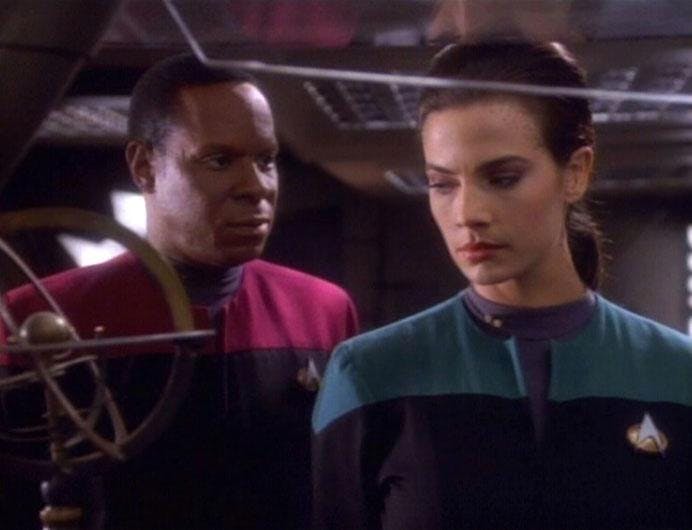
the materials that had been generated on it so far - by David Gerrold, Robert Justman and by him. I was intrigued and drawn into the process by Gene asking me to create a story that would be the pilot for the new series. That bobbled back and forth between being a two-hour or a one-hour with an additional hour of "Previously on STAR TREK" material. I wound up writing an hour and a half script and Roddenberry rewrote it to include all the "Q" material. My story was about Farpoint and the mystery surrounding it.You've stated over the years that you were displeased with the re-writes done to several ofyour TOS and TNG scripts. First, how was the process of writing or, in some cases, co-writing them? And how frustrating was it to have them re-written?FONTANA: None of our scripts on TOS or TNG were co-written. Always a writer came in and pitched a story we bought or was assigned a story we had. (See the original TOS bible.) The writer went home after consulting with us and wrote the story. Turned it in, came in and got notes. Went home and wrote the first draft script. Came in and got notes. Went home and wrote the second draft script. After that, if the script needed revision or rewrite, it was assigned to staff to do so. "Staff" on TOS was Coon, Black, Karabatsos, me or John Meredyth Lucas. Roddenberry might come in after that and rewrite - more so on the first 13 than later. On TNG, when I was on it, staff was me, Bob Lewin, Herb Wright, and Maurice Hurley. David Gerrold was on early, but did not stay. On both series, if a story didn't work after it was turned it, it was cut off and shelved. We have very few of those while I was on staff. If revision or rewrite is so massive, it means the staff writer may get credit, it automatically goes to the Writers Guild of America for credits arbitration.If you'd been on staff for season three of TOS and for TNG, do you think you could have fought for your drafts?FONTANA: Sure. Who wouldn't?You also wrote "Dax" for DS9. How did that come about? Did Rick Berman or Michael Piller invite you in? How satisfied were you with any rewriting done on that, and with the final episode?FONTANA: My agent urged Michael Piller to have me come in on DS9's first season. I was assigned "Dax" which was an idea they had on tap to be scripted. The script was somewhat rewritten - primarily to allow for changes that were going on with the characters who were just developing in the early stages of the series. I liked the way it turned out and had no problems with it. At the end of the day, what would you like to think were your contributions to Star Trek?FONTANA: Primarily the development of Spock as a character and Vulcan as a history/background/culture from which he sprang.Click HERE to read part one of our exclusive StarTrek.com interview with Dorothy Fontana.

